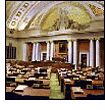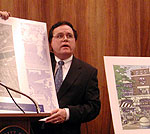Stadium bill passes crucial House test
By Michael Khoo
Minnesota Public Radio
March 26, 2002
The Minnesota Twins have taken a major step towards realizing their ballpark dreams. The Minnesota House voted 80-52 in favor of stadium legislation that requires little direct funding from the state, but could raise taxes in local communities to help pay for a new ballpark. The plan must now be reconciled with a Senate version passed earlier this month before being sent to Gov. Jesse Ventura.
| |
|
|
|
||
Not since the Legislature approved construction of the Metrodome has a stadium bill made it out of both houses. Competing versions from the House and Senate must still be merged in a conference committee, but Rep. Harry Mares, R-White Bear Lake, says progress so far has been encouraging.
Mares, the chief author of the House proposal, says momentum began to build when the Ventura administration offered a proposal that eliminated the need for new state taxes or surcharges.
"That got us to first base. Taxes, Ways and Means was second; floor was third; and now we go to conference. And I don't know if we'll try to have a bunt to score the run or hit a home run. I don't know what. But we'll do our best," he said.
The plan is driven by the difference between what it costs the state to borrow money and what a special gift fund could generate in investment earnings. Supporters of the plan say a $330 million stadium can be financed if only half that amount is available to start the gift fund, and if the team makes annual payments of $10 million a year.
The team has embraced the plan as the most likely to satisfy all sides. But they're clearly counting on help from other private partners and from a local government to produce the seed money and/or make the annual payments.
Team spokesman Dave St. Peter nonetheless says the vote is good news for Twins fans. "The Twins organization has been at this for quite some time. And we're very appreciative of those members of the House who took a courageous vote in terms of voting to put a plan in place that keep Major League Baseball - and specifically the Minnesota Twins - playing in Minnesota for years to come," he said.
| |
|
|
|
||
As a safeguard, the bill was amended to require that Major League Baseball reduce the disparities between wealthy, large-market teams and their small-market rivals before state participation could move forward. Supporters of the bill say that provision could interfere with the timing of the plan, which relies on the current low-interest rate environment.
St. Peter says the team has some concerns about that proposal, too, which could be removed when the bill is merged with its Senate counterpart. Opponents worry about local taxes authorized in the bill.
The plan would allow a host community to raise bar, restaurant, and lodging taxes to fund the stadium. Those increases would be subject to a June referendum.
Rep. Phil Krinkie, R-Shoreview, says the local taxes make the deal as objectionable as previous plans. Krinkie says the only thing that's changed is the stamina of the opposition.
"The citizens who don't want us to be a state bank for Carl Pohlad, who don't want their tax dollars used to finance a stadium, they've given up. They've gone away," he said.
Recent polls indicate, however, that opponents haven't just gone away, many may have converted. Many lawmakers say that following the threat to eliminate the team constituents became more eager solve the stadium problem.
A recent St. Paul Chamber of Commerce poll found 60 percent of residents in that city support public assistance. But
Progressive Minnesota Executive Director Dan McGrath says once the public understands the details, they'll vote as they have in the past.
"Apparently the stadium issue is the only one that the Legislature feels the need to go back to voters and ask if they were sure the first time. The fact of the matter is is that voters in 1997 and '99 voted against massive public subsidies for a stadium," he said.
The House bill is markedly different from ballpark legislation approved by the Senate earlier this month, which requires a new slate of taxes, surcharges, and user fees to pay for the stadium. But the chief Senate author says he expects lawmakers to quickly adopt the House financing model as a framework.
More from MPR

